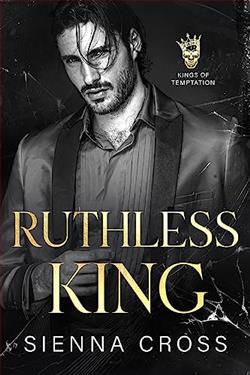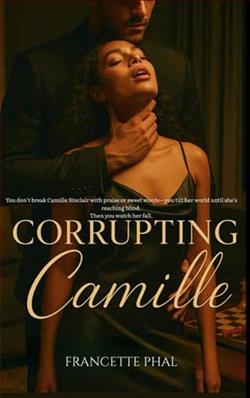Page 33 of Mission Shift
She gave a small nod but stayed silent. I readjusted the pack on my shoulders and kicked a rock out of the path.
“It was good you had them,” she said after a few beats of silence. “I didn’t have that luxury. I had to survive all by myself.” Her voice held a note of wistfulness.
She was quiet for another moment before glancing over at me, her expression softening. “I can’t imagine what that must have been like. Losing both of your parents so young—and in such terrible ways. For your mother to be in so much pain…and then for you to lose your only other parent, no matter what kind of man he was. You were just a kid, you and your brothers.” She shook her head slightly. “It says a lot about you that you didn’t let it destroy you. That you became someone who helps others when they’re at their lowest.”
The sincerity in her voice caught me off guard. This wasn’t the cold, closed-off woman I’d met back at that abandonedUkrainian house. There was empathy in her, something deep and real. It was like she was giving me a glimpse of her true self.
“Thanks,” I said quietly. “It wasn’t easy, but we leaned on each other. That’s what got us through.”
She nodded slowly. “You’re lucky. A lot of people…they don’t get that kind of support. They have to carry everything alone.”
That comment hit me hard. It revealed her loneliness, the years of carrying burdens no one should have to bear all alone. She’d hardened herself into steel because she’d never had anyone else to share the load.
“You’re not alone now,” I said quietly, meaning every word.
Daria’s footsteps slowed, and she looked at me with disbelief. She didn’t say anything, just shook her head slightly before returning her attention to the path ahead.
We kept walking, and I kept holding her hand.
Soon, the sun dipped low on the horizon, and the forest grew dark. We were both exhausted from the relentless trek, and we’d begun tripping over roots and branches, despite having slowed our pace to a walk. Daria kept checking her GPS, glancing at it with increasing frequency. Suddenly, she stopped and turned to me, the exhaustion on her face momentarily replaced with a look of excitement.
“There,” she said, pointing ahead. “There should be a bunker nearby. It was built by the Russian military but never really used. If it’s still intact, we can stay there tonight.”
Shelter. Real, solid shelter. It sounded damn good after a day of running through forests and fields. “A bunker, huh? Okay, lead the way,” I said, adjusting the pack on my shoulders.
We continued moving through the trees, Daria scanning the terrain as she navigated. Eventually, we found it—a thick concrete structure partially buried in the earth. It had a metal door and a small turret poking out from the top.
I grinned. “Not exactly five-star accommodations, but I’ve stayed in worse.”
Daria approached the door cautiously, testing the handle. It gave with a low groan, the hinges complaining but functional. We stepped into the darkness. The walls were thick, the air cool and still. There was enough space on the concrete floor for both of us to lie down, and beneath the turret was a small opening that would work as a chimney for a fire.
“This’ll do,” she said, nodding with satisfaction.
I dropped the pack by the door. “It’s nearly dark. Let’s gather some wood and kindling for a fire.”
She nodded, and together we scoured the area, finding enough dry wood for a decent fire. We stacked it over the kindling, and I stuffed some of the papers and a few hryvnia around the edges. Then I pulled out the flint and steel, scraping the steel over the stone in a nice rocking motion and sending sparks flying in the air. The paper caught fire, followed by the kindling, and soon we had a small fire going. The smoke filtered up and out, leaving the interior of the bunker surprisingly breathable. Its light and warmth were nice in the cold, barren space.
“Not bad,” I said, settling near the fire. “Like camping in a concrete igloo.”
Daria rolled her eyes and started unpacking the rucksack. I spread the plastic shower curtain I’d grabbed earlier across the ground and laid the blanket over it. It wasn’t much, but it beat sleeping on cold concrete. While I worked on adding more wood to the fire, she dug through the supplies, pulling out the pot, oats, honey, and jam.
“We need to eat as much as we can so we’ll have energy for tomorrow’s long trek,” she said. “It’ll be about twenty-six kilometers. Plus, it will make the pack a little lighter for you to carry.” She laughed softly.
Pouring some water into the pot, she placed it into the fire to heat. “Oats and MREs it is,” she said.
“Luxury,” I said dryly, picking up an MRE and opening it. I tore open some of the little packages and peeked inside them. Stewed meat, dried nuts, some crackers, and—another chocolate bar. Hell yeah. The Russians might get a lot wrong, but they sure knew how to make good chocolate.
Daria raised an eyebrow. “You really like those?”
“Chocolate’s chocolate,” I said with a shrug. “Especially after a day like today.”
As the oats thickened over the fire, Daria tossed me a wet wipe from one of the MREs. “Clean your hands before you eat.”
“Yes, ma’am,” I replied, giving her a mock salute. I wiped down my hands with the cool, citrus-scented cloth. She did the same before dishing out the porridge, adding honey and jam like before, and passing me a bowl. We ate in comfortable silence, staring into the crackling fire.
We forced down the MRE stew next, followed by the plums. I couldn’t help but chuckle as I savored the chocolate. Simple pleasures.
Daria scooted back, stretched her legs out, and leaned back against the wall. “I’ll take the first watch,” she said, her tone leaving no room for debate.















